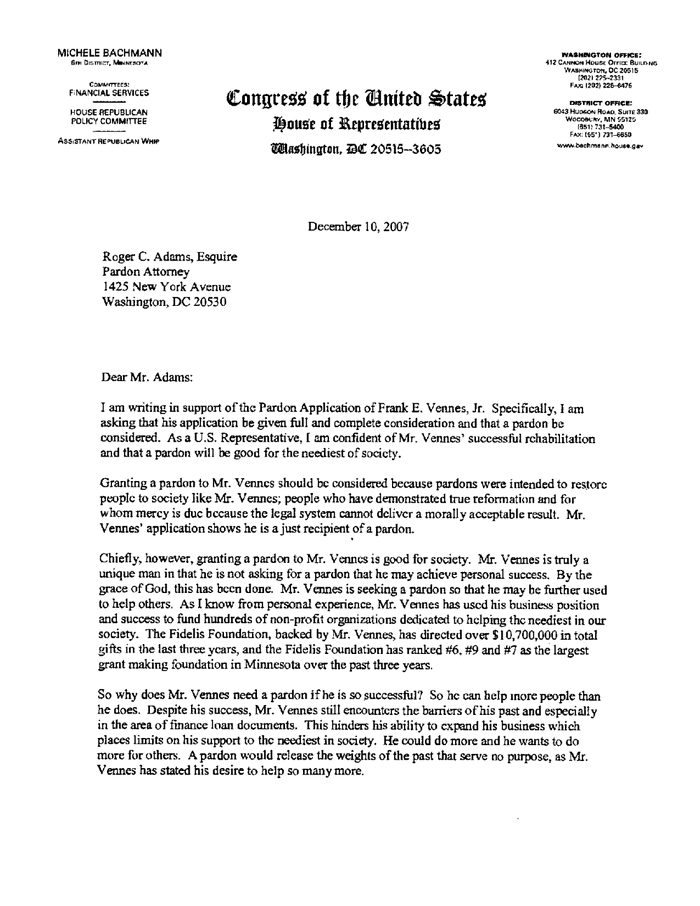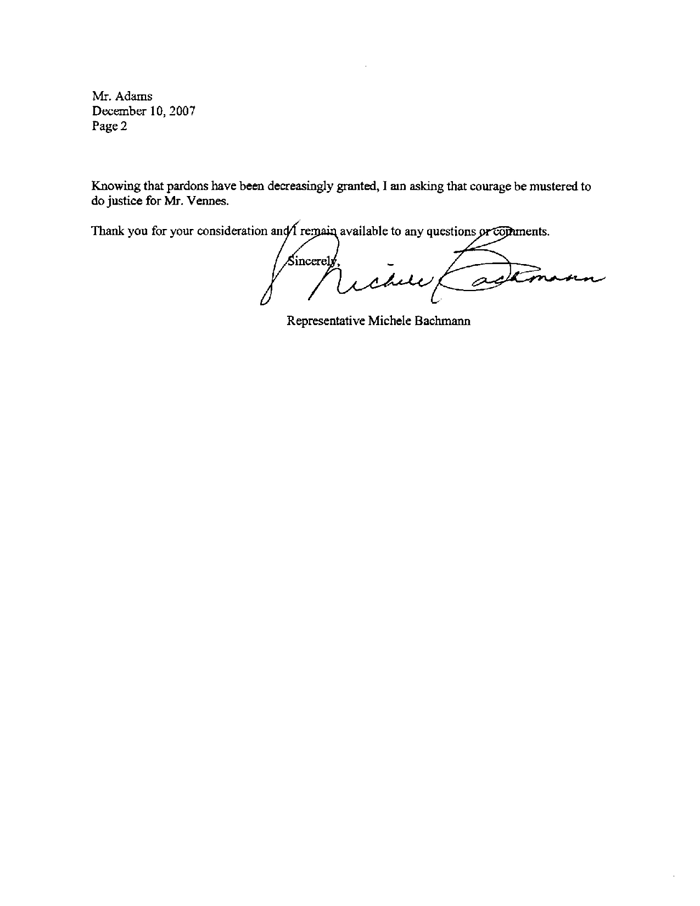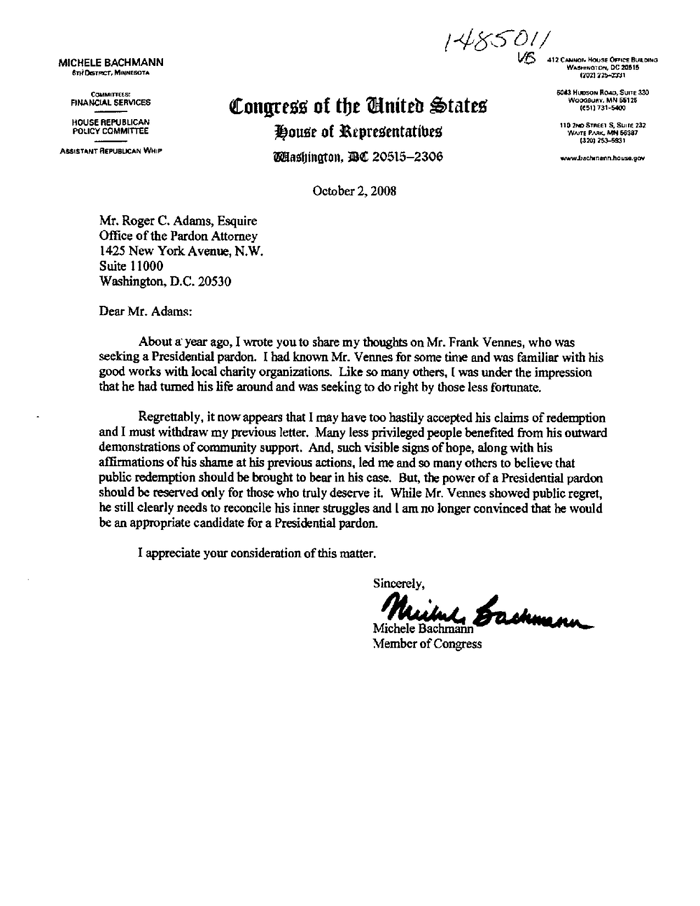A community of 30,000 US Transcriptionist serving Medical Transcription Industry
Michele Bachmann Quietly Returns Campaign Cash
Posted: Oct 28, 2013
For someone who's always touting the Bible, Michele sure is having a lot of run-ins with the law, and hanging with a whole bunch of very questionable people. Here's yet another. The cash she's returning will be distributed to the donor's victims. Anyway, seems she wasn't able to deliver what he paid for -- pardons for his crimes.
Michele Bachmann Quietly Returns Campaign Cash From Notorious Ponzi Schemer

Rep. Michele Bachmann (R-Minn.) has quietly returned campaign contributions from an ex-con who lured investors for one of the biggest Ponzi schemes in US history—and on whose behalf the tea party lawmaker sought a presidential pardon. According to campaign finance reports, last quarter Bachmann's campaign committee paid $14,000 to a bankruptcy trustee for Frank Vennes, a former North Dakota pawnshop owner who was recently sentenced to 15 years in prison for aiding and abetting fraud.
Vennes has a long history of run-ins with the law. In 1986, federal agents investigating a drug ring in Bismarck came to suspect he was laundering drug money. Posing as Chicago businessmen, investigators began giving Vennes large sums of cash to smuggle out of the country. In one case, according to court documents, Vennes hand-delivered $100,000 to Geneva, where his associates either lost or stole it.
The following year, Vennes was convicted of money laundering—along with cocaine distribution and illegal firearm sales—and sentenced to five years in Minnesota's Sandstone penitentiary. He later sued the federal government for more than $10 million, claiming the federal agents had forced him to peddle drugs and guns to recoup the missing $100,000 and threatened to kill and "dismember" his children if he refused. (Vennes lost; the case was thrown out on appeal.)
Vennes had a jailhouse conversion and threw himself into studying scripture. After his release, he embedded himself in Minneapolis's evangelical community, with the help of his prison ministry friends. He eventually began soliciting private funding for a firm called Petters Company Inc. (PCI), which ostensibly bought overstocked electronics and resold them to big-box retailers at a profit. And he invited local pastors, churchgoers, and religious charities to invest. Vennes also helped set up a family of hedge funds that funneled more than $1 billion dollars into PCI—which, it turns out, was a Ponzi scheme. It's unclear whether Vennes knew this at the time, but the record shows he actively misled investors about PCI's business dealings.
By 2005, when Bachmann rolled out her first congressional campaign, the scheme was teetering. Vennes, who had been seeking a retroactive pardon for his previous conviction, began pursuing one with new vigor. According to subsequent FBI wiretap recordings, Vennes knew he might face criminal charges, and was desperate to avoid the stiff sentencing that comes with being a repeat offender. As I reported in The New Republic, that's where Bachmann came in:
In the run up to the 2006 election, Vennes and his associates began donating generously to Michele Bachmann, who was making her first run for Congress. He, his family, and his business associates—namely, lawyer Craig Howse, whose firm managed Vennes's business affairs and lobbied for him in Minnesota, and financial adviser Darrel Amiot, who helped Vennes bring in investors—made two batches of coordinated campaign contributions totaling just under $50,000 to Bachmann and her joint fundraising committee. Vennes also gave $10,000 to the Republican Party of Minnesota.
After being elected to Congress, Bachmann began lobbying for Vennes's pardon, an unusual step given that he lived outside her district:
In December 2007, Bachmann…wrote a letter to the Office of the Pardon Attorney (OPA), which two years earlier had recommended that the White House reject Vennes's clemency petition. Noting that she was "confident of Mr. Vennes' successful rehabilitation," she argued that he needed the pardon because his criminal record was a stumbling block “in the area of finance loan documents," which limited the growth of his business and his charitable giving. "Mr. Vennes is truly a unique man in that he is not asking for a pardon that he may achieve personal success," she added. "Mr. Vennes is seeking a pardon so that he may be further used to help others. As I know from personal experience, Mr. Vennes has used his business position and success to fund hundreds of non-profit organizations dedicated to helping the neediest in our society."
According to a former Bush administration official who was privy to the negotiations, around this time both Bachmann and [Tim] Pawlenty also began lobbying the White House on Vennes's behalf (an allegation Pawlenty denies). This apparently helped set some gears in motion. In early June 2008, the White House asked the OPA to take a second look at Vennes's application, after which it began vetting the case anew. On June 30, Vennes, his wife, and his lawyer dumped another $11,200 into Bachmann’s campaign coffers. According to the Bush administration official, Vennes's pardon application was sent to the White House with a recommendation for approval, where it remained, presumably awaiting end-of-term signature by President Bush.
Vennes's pardon never came through. In September 2008—just weeks before the 2008 presidential election—federal agents raided his home as part of a burgeoning investigation into the Petters Ponzi scheme, and the breathtaking details of the swindle began coming to light. At the time, the Petters fraud, which brought in more than $36 billion over the course of a decade, was the largest known Ponzi scheme in US history. Its collapse would turn out to be spectacular.
The fallout from the scam moved through the Twin Cities like a slow-motion tsunami. Businesses went bankrupt. Charities slashed staff and walked away from half-built offices...Countless people also lost their homes or watched their retirement savings dry up. The tight-knit evangelical circles in which Vennes moved were among the most devastated. "If only a few had gotten hit, the faith community could have stepped in to help them," explains Carolyn Anderson, the attorney representing evangelical investors. "But everybody got hit. The safety net was ripped out."
There's no indication Bachmann knew about Vennes's ongoing criminal activity. In October 2008, she sent OPA a second letter saying she "may have too hastily accepted his claims of redemption" and withdrew her support for his pardon. But she didn't return Vennes's donations—until now. Bachmann's recent $14,000 payout covers roughly 80 percent of the contributions that Vennes and his wife made directly to her campaign, but not the $10,000 they gave to her joint fundraising committee or the thousands of dollars their family and business associates donated, according to campaign finance reports. The refunded money will be divided among Vennes's victims, who are expected to recoup pennies on the dollar. Bachmann's office did not return calls and emails seeking comment.
Below are Bachmann's letters regarding Vennes's case.
Oh my! Maybe the House Ethics Committee should extend - it's investigation
[ In Reply To ..]a bit further back than her 2012 presidential campaign bid. This is a truly fascinating little tidbit, I must say.
Voters need to do their own investigations. These stories - of unsavory associations have been popping
[ In Reply To ..]up for years. How did she keep being reelected?
Similar Messages:
Michele Bachmann: Welfare QueenDec 23, 2009
Michele Bachmann: Welfare Queen Posted on Dec 22, 2009 By Yasha Levine Michele Bachmann has become well known for her anti-government tea-bagger antics, protesting health care reform and every other government “handout” as socialism. What her followers probably don’t know is that Rep. Bachmann is, to use that anti-government slur, something of a welfare queen. That’s right, the anti-government insurrectionist has taken more than a quarter-million dollars in g ...
Michele Bachmann's Jobs PlanAug 27, 2011
She's is considering adjusting the minimum wage to make us more competitive with overseas. Yay! http://old.news.yahoo.com/s/ap/20110827/ap_on_el_pr/us_bachmann2012 ...
Michele Bachmann Faces CongressionalMar 25, 2013
Peter Waldron, who served as Bachmann’s national field coordinator in the 2012 presidential race, has filed an the Federal Election Commission complaint alleging that the lawmaker’s campaign improperly used leadership PAC funds to pay presidential campaign staff. He says he has spoken to investigators in what he described as “a very cordial two-hour meeting,” and other staffers tell the Daily Beast that the questions they were asked relate to the same payme ...
Trying To Decide Between Michele Bachmann And Sarah PalinMar 12, 2011
Is anyone else trying to decide between these two women for President? How are you deciding? Which one would be the best? ...
Michele Bachmann Says "God Lifted TrumpJul 13, 2016
...
Another Couple That Needs To Be Quietly Eliminated; Yet, Instead We Will Dec 02, 2009
http://cosmos.bcst.yahoo.com/up/player/popup/?rn=3906861&cl=16943861&ch=4226713&src=news all human crap like this needs to be removed permanently. ...
So In The Meantime Trumpie Is QuietlyJul 28, 2016
78 "guest workers." For waiters and cooks? Really? He can't fill those jobs with Americans? He is a big fat phony. He creates jobs for no one. He is a joke. ...
Feds Quietly Drop All Charges Against Sheriff Joe.Sep 01, 2012
to finding something about that pesky birth certificate. ...
Obama Administration Quietly Prepares Surge Of Millions Of New Immigrant IDsOct 20, 2014
...
WH Quietly Releases Plans For 3415 Regulations Ahead Of ThanksgivingNov 25, 2014
While Americans are focused on what delicious foods they’re going to eat for Thanksgiving, the White House is focused on releasing its massive regulatory agenda– marking the fifth time the Obama administration has released its regulatory road map on the eve of a major holiday. The federal Unified Agenda is the Obama administration’s regulatory road map, and it lays out thousands of regulations being finalized in the coming months. Under President Barack Obama, there has been a ...
Fearing Cheney's Wrath, Bush Officials Quietly Hail ObamaJan 05, 2010
By Daniel TencerMonday, January 4th, 2010 -- 2:40 pm Half a dozen former Bush administration anti-terrorism officials have told the New York Times that they support President Barack Obama's approach to fighting terrorists, but won't go on the record for political reasons. According to an article by Peter Baker, published at the New York Times Magazine Monday, some of the unnamed former Bush officials say they fear reprisals from former Vice President Dick Cheney, who has been relentl ...
FBI Quietly Releasing Documents Via Julian Assange & Wikileaks. Counter Coup To Clinton Attack!Nov 02, 2016
http://www.tdnewswire.com/breaking-watch-now-real-video-folks-fbi-quietly-releases-documents-via-julian-assange-wikileaks-counter-coup-clinton-attack-happening-now/ FBI is Quietly Releasing Documents Via Julian Assange & Wikileaks. A Counter Coup to the Clinton Attack is Happening NOW!!! This is really happening people. This is WHY Comey wrote the letter. This is WHERE is the documents we have all been waiting for and expecting from WIKILEAKS are coming from. NOT the Russians…. the US ...
Words Of Wisdom, By Michele BauchmannOct 04, 2012
Swine flu: "I find it interesting that it was back in the 1970s that the swine flu broke out under another Democrat president, Jimmy Carter. I'm not blaming this on the President Obama, I think think it's an interesting coincidence." --Comparing the 2009 swine flu outbreak to the 1976 outbreak that occured under...Gerald Ford. 2009 On the national debt: "I think if we give Glenn Beck the numbers, he can solve this." -2011 Michael Steele: "Michael Steele--you d ...
Michele Bachman Promises To Take America Back To Aug 18, 2011
. ...
Michele Bachman,TP Spokesperson Says Obama Is Waving A Tar BabyApr 21, 2012
I bet there are at least 2 on the board who would say it is Obama's fault. ...
Anti-bachmannNov 05, 2009
Anthony Wiener pledged to collect 5 sigs pro public option for every 1 person that showed up today to support Michelle Bachmann's stunt. You can support his effort at countdowntohealthcare.com. ...
God Gives Bachmann The All-ClearJun 01, 2011
Me thinks God is up there smoking dope! Apparently, Michele Bachmann is now confirming that she has received the long-awaited go-ahead from the Lord on her presidential run. Per Eric Kleefeld, she revealed that she had received His blessing in an interview with Iowa Public Television: Henderson: You recently referenced your Christian faith. Former Arkansas Governor Mike Huckabee, when he announced he would not run, said that he just didn't feel called to do that. Have you had that ...
Budget Director Returns To JobDec 21, 2010
woo hoo! ...
Trump Needs To Release Those Tax ReturnsSep 16, 2016
No one should even consider voting for him until he releases those returns. It's bad enough that he probably paid no income tax but we need to know what he owes to the Chinese and Russians. Their interests are not those of the U.S. and the American public needs to know exactly what has been going on. We don't even know if he has really been under an IRS audit as he has never produced their letter saying they were going to audit him. ...
Transgender Teacher ReturnsMar 24, 2014
Interesting... ...
Cash Of The TitansJan 11, 2012
stand back citizens and see whose money buys the republican nomination. Huntsman zillionaire father funding his Super PAC but really pales when compared to Romney's kagillions. Newt infuriated with Romney slap ads now has Vegas billionaire putting 5 million up for Newt to fight back. What does this have to do with the average citizen? Absolutely nothing, unless you consider elections important. ...
Clinton CashJul 28, 2016
It's about an hour, but well worth it. I would love to think that some democrats would watch it and wake up as well, but they probably won't. ...
Democrats Love BachmannNov 08, 2009
Bachmann's Love In ...
What Do You Think About M Bachmann And Newsweek Photo?Aug 10, 2011
I think the Republicans are trying to discredit her and move her out of the way for Romney or some other white guy. And does anyone know where "What's Her Name?" is? Did she quit making noises? Or did they hide her somewhere? ...
Bachmann Says Obama's Certificate UsedApr 22, 2011
http://www.huffingtonpost.com/2011/04/22/donald-trump-net-worth-deposition_n_852376.html ...
Bachmann Just Announced Her CandidacyJun 13, 2011
for President, according to the New York Times. ...
Romney's 1 To 2 Years' Worth Of Tax Returns.Jul 17, 2012
Here's one big problem I see with Romney not releasing more years of his tax returns: How much do you anticipate that we'll learn about Romney's financial dealings by only seeing possibly up to 2 years' worth of tax returns that cover only years that he KNEW he was going to be running for president? ...
CEO Pay Drops But Cash Is KingAug 17, 2010
This is a very long article. I only posted a little of it. You'll have to follow the link for the rest. Here's a bit of good news for the Washington finger-waggers who think executive compensation has gotten out of hand: A survey of 81 big companies shows that CEO pay dropped by 8.6 percent last year. Now for the worrisome twist: The cash portion of their compensation rose 8.3 percent. That's a sign that companies are de-emphasizing long-term incentives for their top guys, a par ...
This Clerk Can Work For Bachmann's InstituteJul 13, 2011
N.Y. town clerk resigns before same-sex marriage law goes into effectBy Jordana Ossad, CNN July 13, 2011 1:37 p.m. EDT New York (CNN) -- A New York town clerk announced her resignation in a letter saying that she would be compromising her "moral conscience" if she signed marriage licenses between same-sex couples. Laura Fotusky, a Republican from Barker, said her decision was based strongly on her religious convictions and obeying the law of God over the law of men. "The Bible clearly teac ...
Bachmann Compares Self To Serial KillerJun 27, 2011
Maybe there can be a history round in the Republican primary debates. In an interview after she announced her candidacy, Michele Bachmann promised to act in the spirit of Waterloo, Iowa’s, John Wayne. But it turns out John Wayne Gacy, the serial killer, lived in Waterloo, while John Wayne, the movie star, lived in Winterset, nearly a three-hour drive away. "Well, what I want them to know is just like John Wayne was from Waterloo, Iowa. That's the kind of spirit that I have, too, ...



